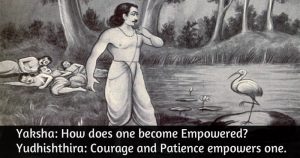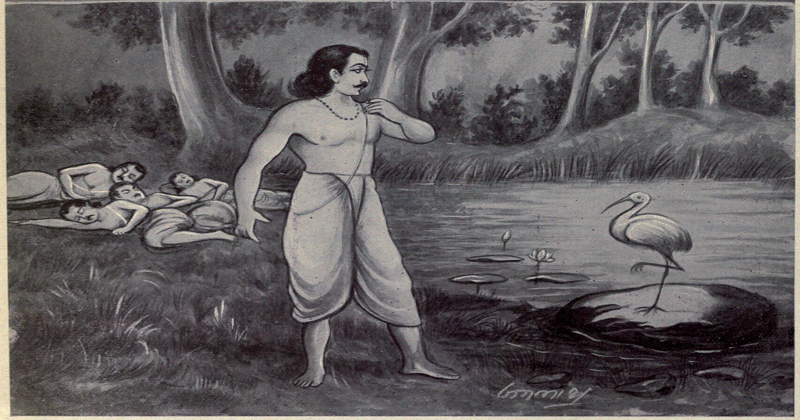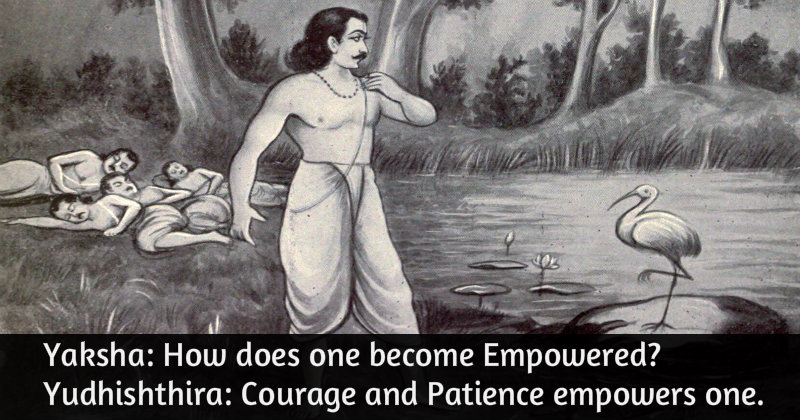
How Yudhishthira Won Over The God of Death By Standing on his Dharma Will Teach You a Great Lesson
In the Hindu epic Mahabharata, Pandavas succumbed to Shakuni’s challenge in the game of dice, lost their kingdom and were forced into exile for 13 years, which included one year in anonymity. During their exile, one day, the Pandavas came across a Brahmin who complained that a deer has taken his Arani on its antlers and, therefore, he was not able to light the fire for the performance of Vedic rituals. The Pandavas set out to retrieve the Brahmin’s Arani, followed the hoof-marks of the deer throughout the day and reached deep in the forest.
In the quest of the mysterious deer, Yudhisthira (the eldest of the Pandavas), became exhausted and thirsty. His brother Nakula thus ventured out to fetch water and found a beautiful lake, which was haunted by a Yaksha. The lake was devoid of any living creature except a crane (Baka). However as Nakul approached the lake, he heard a strong and clear voice of warning:
Ma tata sahasam karshirmama purva parigrahah prashnanuktva tu madreya pibasva ca harasva ca ‘Do not dare to touch that water, my dear child. You must first answer my questions. . .’
The voice said he was the owner of the lake and unless he (Nakul) happened to answer his questions, he would not be allowed to drink the water. In case he disregarded the warning and drank the water, he would be dead. Nakula ignores, drinks the water and collapses instantly. Same happened with Sahadev.
When Arjun came to the lake, he saw Nakul and Sahadev lying unconscious and believed it to be the work of some Gandharvas. He heard the same voice again, and thinking it to be some demon, shot a number of arrows, but to no avail. He too did not heed the voice and fell unconscious after drinking the water. The same happened to Bheem, who challenged the invisible voice to come out and fight.
Since none of the brothers returned with water, Yudhishthir comes in search of them fearing any harm may have come. Upon following the same path, Yudhisthira again came across the lake and was shocked seeing all his brothers lying lifeless, wondering who could have vanquished them. And the same voice again spoke to Yudhistir, saying: Tavanujah maya preta vasham nita. . . – I am the cause of your brothers’ death. Na chet prashnan prcchato vyakaroshi tvam pancamo bhavita. . . . – You shall be the fifth victim if you do not answer my questions.

Yudhistir, unlike his brothers, agreed to answer the questions. The voice identified itself as a Yaksha, and thus began a series of questions. The virtuous Yudhisthira proceeded to answer the questions put forth by the crane.
The Yaksha asks Yudhishthira over a hundred questions covering many aspects of applied Dharma. Yudhishthir gives amazing and enlightening answers to very difficult questions asked by Yaksha. These questions and their answers are as important, as relevant and as significant today as they were when Yudhishthir stood with palms folded, by the side of his dead brothers, and attempted to do his best in meeting the Yaksha’s challenge. These answers have guided the lives of Hindus for thousands of years.
We have picked few question and answers from them to write down here.
Yaksha: What is weightier than earth?
Yudhishthira: Mother
Yaksha: What is taller than the sky?
Yudhishthira: Father
Yaksha: What is faster than the wind?
Yudhishthira: Mind
Yaksha: What is more numerous than grass?
Yudhishthira: Thoughts
Yaksha: Who is his God-given friend?
Yudhishthira: His wife
Yaksha: Who is the friend of the dying?
Yudhishthira: His charity
Yaksha: How does one become empowered?
Yudhishthira: Courage and patience empowers one.
Yaksha: By renouncing what does one become loved?
Yudhishthira: Pride
Yaksha: By renouncing what is one free of sorrow?
Yudhishthira: Anger
Yaksha: By renouncing what does one become wealthy?
Yudhishthira: Desire
Yaksha: By renouncing what does one become happy?
Yudhishthira: Greed
Yaksha: What treasure is the best?
Yudhishthira: Skill
Yaksha: What wealth is the best?
Yudhishthira: Education
Yaksha: What is the greatest gain?
Yudhishthira: Health
Yaksha: What is grief?
Yudhishthira: Ignorance is grief.
Yaksha: What is poison?
Yudhishthira: Lust is the real poison.
Yaksha: And the greatest happiness?
Yudhishthira: Contentment
Yaksha: What is a man’s self?
Yudhishthira: His progeny
Yaksha: What constitutes forgiveness?
Yudhishthira: Forbearance of dichotomy in the world is the greatest forgiveness.
Yaksha: What is the meaning of charity?
Yudhishthira: Charity is the protection of all creatures.
Yaksha: What is death for a man?
Yudhishthira: A poverty-stricken man is as good as dead.
Yaksha: What supports his life?
Yudhishthira: Rain
Yaksha: What is his principal duty?
Yudhishthira: Charity
Yaksha: What makes the sun rise?
Yudhishthira: Brahma
Yaksha: What causes the sun to set?
Yudhishthira: Dharma
Yaksha: Which is the invincible enemy?
Yudhishthira: Anger is the invincible enemy.
Yaksha: What constitutes an eternal disease?
Yudhishthira: Covetousness constitutes an eternal, incurable disease.
Yaksha: Who is truly happy?
Yudhishthira: One who is not burdened by debts is truly happy.
Yaksha: What is envy?
Yudhishthira: Envy is nothing but grief of the heart.
Yaksha: What is so strange about humans?
Yudhishthira: People keep worrying about death, even though they know it is inevitable.
The Yaksha now pleased with Yudhistir, gave him a boon by which he could have only one of his brothers back. Yudhistir chose Nakul, and the Yaksha was surprised by the answer. Why Nakul? why not Arjun or Bheem who were much stronger and more powerful, the Yaksha asked.
To this Yudhisthir replied, “My father had two wives, Kunti and Madri. Arjuna, Bhima, and I are the sons of Kunti and Nakula and Sahdevam are the sons of Madri. I a son of Kunti still alive, so in all fairness and justice, a son of Madri, should also be alive. I request you to grant life to Nakul”.
The Yaksha was now fully pleased by Yudhistir’s answer and he revealed himself to be none other than Yama, the God of Death, and also Yudhistir’s father in a sense, he was born through his blessings. Yama emphasized that this was just a test to see how steadfast Yudhistir was to his Dharma, and having passed it, he would now get back all his brothers alive.
